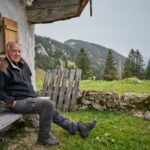Joyce Glasser reviews Hitchcock/Truffaut
On Alfred Hitchcock’s birthday, 13 August, in 1962, François Truffaut arrived at Universal Studios in Los Angeles to begin 50 hours of interviews with Alfred Hitchcock, accompanied by his translator Helen Scott and stills photographer Philippe Halsman. The French New Wave filmmakers adored American cinema in general, and Hitchcock (despite being British) in particular, and it bothered Truffaut that in the USA Hitchcock was not taken seriously. As we learn in Kent Jones’ enjoyable documentary, Hitchcock/Truffaut, Truffaut’s interviews were compiled as a book and became a bible for cinephiles and up-and-coming filmmakers. While Jones’ documentary is therefore, essential viewing, it would have been improved by less focus on the talking heads as well as on Psycho.
Hitchcock’s consent to 8 days of interviews was not merely the reward for Truffaut’s flattery. Hitchcock knew the young man’s directorial debut, The 400 Blows, had won the Palme D’Or at Cannes. Thanks to Truffaut’s intelligent questions, knowledge of Hitchcock’s work and his enthusiasm, Hitchcock’s jokey responses to the press suddenly became a serious and surprisingly detailed, though hardly dry, discourse on his technique and attitudes.
What you cannot get from the books, are the voices of Truffaut and Hitchcock and the wonderful clips, used to illustrate Hitchcock’s various points.
Hitchcock did not believe filmmaking could be taught, ‘except if students were to learn to make silent films, for there is no better exercise’. He believed that ‘the talkie has often merely brought the theatre into the cinema. Too many young people imagine that one can be a director without being able to design a set or supervise the editing oneself’. This is not only a useful insight for would-be filmmakers but an attitude that is not in keeping with Jones’ decision to bring in talking heads.
The comments of some of America’s top contemporary filmmakers including, Wes Anderson, Martin Scorsese and David Fincher, and two French filmmakers, Arnaud Desplechin and Olivier Assayas are intended to remind us of Hitchcock’s lasting influence. Unfortunately, some of the comments include the obvious, the slightly pretentious and the superfluous. David Fincher tells us that his father gave him Truffaut’s book, which is ‘not even a book anymore, but a pile of papers,’ referring to its constant usage. This is a shame, you might think, because an original hardback of the book, used, but with a straight spine, sells for upwards of $700.
Truffaut tells one of the best Hitchcock anecdotes that is not, sadly, in the film. It’s relevant, though, as it concerns the first time Truffaut tried to interview Hitchcock, when he was a 23-year-old critic for Les Cahiers du Cinema. Hitchcock, who had completed location shooting of To Catch a Thief on the Riviera, agreed to an interview with Truffaut and Claude Chabrol and asked them to wait for him at the bar. They were so elated that they failed to see a frozen pond and fell in, arriving at the bar soaked. A year later, when the pair approached Hitchcock at a Press Conference, he said: ‘Gentlemen, every time I see a pair of ice cubes clicking together in a glass of whiskey, I think of you two.’
Truffaut’s interviews were organised chronologically, making it a practical treasure trove for students and academics. But Jones gets stuck on Psycho, arguably the most analysed film of the last 50 years. Do we really need yet another analysis of that film, particularly when Jones fails to include Truffaut’s discovery that the killer in the shower scene was, in fact, a woman with a blackened face?
Less Psycho might mean more time for a clip from The Thirty-Nine Steps. ‘What I liked about The Thirty-Nine Steps’, Hitchcock tells Truffaut, ‘are the swift transitions….The rapidity of those transitions heightens the excitement. It takes a lot of work to get that kind of effect, but it’s well worth the effort. You use one idea after another and eliminate anything that interferes with the swift pace.’ This in term complements Hitchcock’s adage: ‘some directors film slices of life, I film slices of cake’. The Thirty-Nine Steps is all cake.
While we know from the book that the friendship between the two men lasted until Hitchcock’s death in 1980, Jones tells us that following the interview, Truffaut and Hitchcock began to send each other draft scripts for comments. Oh to have seen or heard some of those comments!
Truffaut’s aim was to make 30 films and then retire to write books. He died of a brain tumour (four years after Hitchcock) at age 52, five films short of his goal. He did, however, accomplish his goal of changing American attitudes to Hitchcock while giving the world a master class on filmmaking. On the 50th anniversary of that book’s publication, Jones’ documentary is a fitting tribute.




